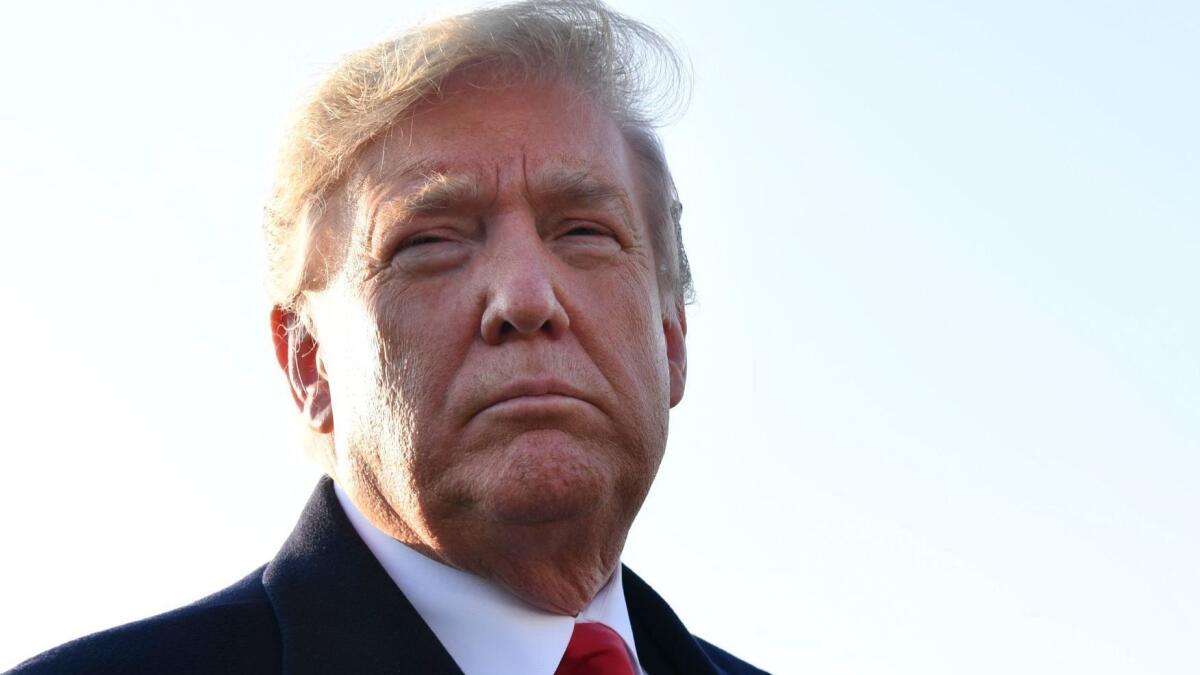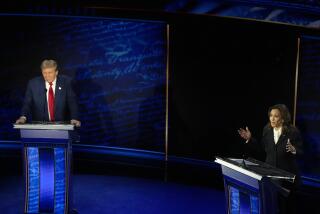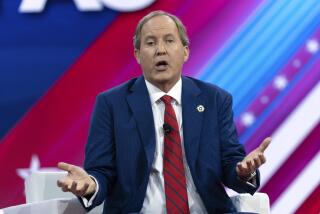Legal scholars dismiss Trump’s plan to challenge Constitution’s protection for citizenship at birth

Reporting from Washington — Legal scholars were quick to dismiss President Trump’s plan to reject “birthright citizenship” by executive order as more of a political stunt than a serious challenge.
That’s because the U.S. Constitution, the Supreme Court and federal law all say that children born within this country are citizens at birth, regardless of the citizenship status of their parents.
In 1866, the Reconstruction Congress passed the first Civil Rights Act, which said that “all persons born in the United States and not subject to any foreign power, excluding Indians not taxed, are hereby declared to be citizens of the United States; and such citizens, of every race and color ... shall have the same right … to full and equal benefit of all laws … as is enjoyed by white citizens.”
This same principle was then written into the Constitution in the 14th Amendment of 1868. “All persons born or naturalized in the United States and subject to the jurisdiction thereof are citizens of the United States and of the state wherein they shall reside.”
In the next decades, Congress adopted severe restrictions on Chinese laborers entering the country, but the generally conservative Supreme Court at the time nonetheless ruled in 1898 that a child of Chinese parents born in San Francisco was a citizen of the United States.
“As appears upon the face of the [14th] Amendment, as well as from the history of the times, this was not intended to impose any new restrictions upon citizenship, or to prevent any persons from becoming citizens by the fact of birth within the United States,” the court said in U.S. vs. Wong Kim Ark.
“The opening sentence of the Fourteenth Amendment is throughout affirmative and declaratory, intended to allay doubts and to settle controversies,” the court added.
It did that for a century or more. Congress and the Justice Department throughout the 20th century said native-born children were U.S. citizens at birth, even if their parents were here illegally.
On Tuesday, constitutional experts reacted with sharp skepticism to Trump’s proposal.
“No doubt the White House can produce at least three stooges to say that the executive order is lawful and then claim that legal experts are ‘divided’ on this issue. It’s a lie,” Gerard N. Magliocca, a 14th Amendment scholar at the Indiana University law school, wrote on a legal blog.
“There are many legal issues that divide liberal and conservative scholars. Birthright citizenship is not one of those issues,” said Josh Blackman, a professor at South Texas College of Law in Houston. “There is a broad — but not unanimous consensus — that the 14th Amendment grants citizenship to people born in the United States, regardless of their parents’ citizenship.” He said Trump’s talk may be geared just for the midterm election.
It is not clear whether lawyers in the Trump administration have been consulted and are ready to defend Trump’s proposal.
Walter Dellinger, a former White House lawyer in the Clinton administration and Duke law professor, voiced doubt in a tweet. “It would be shocking if executive branch officials violated the statute and the Constitution on Trump’s order,” he wrote.
Immigration lawyers were equally caustic. Beth Lyon, an immigration law professor at Cornell, called Trump’s proposed order “a deeply unethical political stunt that will fail in the courts because it is unconstitutional.”
Critics of birthright citizenship say the framers of the 14th Amendment did not mean to apply its provisions to foreigners who were in the country illegally.
John Eastman, a law professor at Chapman University in Orange County, described the legal consensus on this issue as being based on a “faulty premise.” He said the Supreme Court’s 1898 decision rested on the idea that the Chinese parents were lawful residents.
Michael Anton, a former Trump administration official, urged the president this summer to take on the issue.
“The notion that simply being born within the geographical limits of the United States automatically confers U.S. citizenship is an absurdity—historically, constitutionally, philosophically and practically,” he wrote in the Washington Post in July. “This problem can be easily fixed. Congress could clarify legislatively that the children of non-citizens are not subject to the jurisdiction of the United States and thus not citizens under the 14th Amendment.” And if Congress refused, Trump should do so through an executive order, he said.
Anton and Eastman argued the children of immigrants in this country illegally are not “subject to the jurisdiction” of the laws, and therefore are not entitled to citizenship.
But James C. Ho, a newly appointed Trump judge on the 5th Circuit Court, disagreed with this narrow view in a 2006 article entitled “Defining ‘American.’” He said the phrase “subject to the jurisdiction” has a simple and broad meaning. It “covers the vast majority of persons within our borders who are required to obey U.S. laws. And obedience, of course, does not turn on immigration status, national allegiance or past compliance. All must obey,” he wrote.
Ho concluded that the only way to end birthright citizenship is to amend the Constitution. As it stands now, he wrote, “that birthright is protected no less for children of undocumented persons than for descendants of Mayflower passengers.”
More stories from David G. Savage »
Twitter: DavidGSavage
More to Read
Get the L.A. Times Politics newsletter
Deeply reported insights into legislation, politics and policy from Sacramento, Washington and beyond. In your inbox three times per week.
You may occasionally receive promotional content from the Los Angeles Times.











